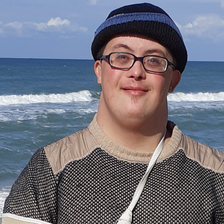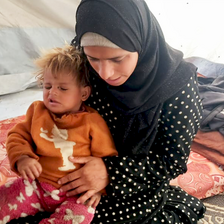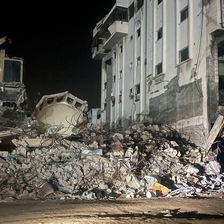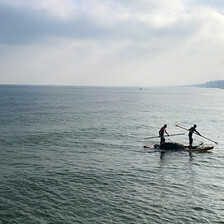The Electronic Intifada 11 February 2025
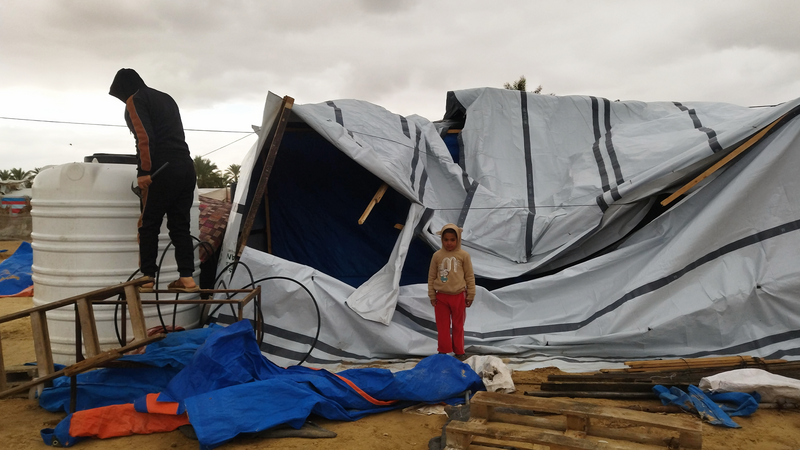
The Abu Ghali family’s tent collapsed in recent storms in Deir al-Balah.
Along the coastline of Deir al-Balah, central Gaza, where tents are pitched atop muddy ground, Ibtihal Abu Ghali, her husband Osama and their four children are living in dire conditions.
“Every night, we shiver from the cold,” said Ibtihal, 39. “We try to cover the children with whatever blankets we have, but nothing is enough.”
At the beginning of February, winter storms struck the area, uprooting some tents and flooding others.
“We were asleep when the winds suddenly howled,” Ibtihal said. “I felt the tent lifting off the ground. My husband rushed to hold it down, but the winds were stronger.”
She said that heavy rain flooded the tent, collapsing the walls and leaving the entire tent, including all their blankets, soaked.
The family sought shelter from the downpour that night with displaced neighbors.
Since the ceasefire agreement was announced on 15 January 2025, the Abu Ghali family has been waiting for the agreement’s humanitarian provisions to be enacted, including the shipment of 60,000 mobile homes and 200,000 tents into Gaza.
The Abu Ghali family was forcibly displaced to Deir al-Balah from the Yibna camp, east of Rafah, in May 2024.
When the ceasefire took effect, Ibtihal and Osama went to the site of their home, which Israel had destroyed in an airstrike, hoping to place their tent next to the ruins until reconstruction began.
However, the destruction was so overwhelming that they couldn’t even set up their tent, and they had to return to Deir al-Balah, where they remain.
Delayed aid
Salama Maarouf, head of Gaza’s government media office, told The Electronic Intifada in a phone interview that “the occupation refuses to fulfill its obligations under the humanitarian protocol of the ceasefire agreement.” Specifically, only 20,000 tents of 200,000 have entered Gaza.
“As for mobile homes, not a single one has entered Gaza since the ceasefire agreement was reached,” he said.
Euro-Med Human Rights Monitor has stated that the “humanitarian situation has not improved” despite the Gaza ceasefire and that “about 8,500 trucks have entered the Gaza Strip, but only about 35 percent of them have made it to the northern part of the Strip.”
Maarouf said that the occupation’s failure to meet its commitments by allowing in essential supplies exacerbates the suffering of displaced citizens, particularly in the winter.
Tens of thousands of families, he said, have been forced to sleep in the open air during the recent storms.
“Every night is a new nightmare”
Next to the Abu Ghali family tent, the Shaheen family is also enduring this hard winter with hopes to return home.
They were forced to evacuate from their home in the al-Karama neighborhood in Gaza City in October 2023, during the Israeli ground invasion. They have been living in this camp of makeshift tents along the coast of Deir al-Balah ever since.
“We thought we would return to our home soon, but to this day, we have no idea when reconstruction will begin,” said Mahmoud Shaheen, 42.
Mahmoud, his wife and their five children “dreamed of setting up our tent over the ruins of our home, but when we arrived, we found the place unlivable.”
Their home had been completely destroyed by the Israeli attacks. Rubble fills the streets, and no livable infrastructure remains.
“Everything was buried under rubble, and no efforts have been made to clear the debris,” said Mahmoud.
Now, in Deir al-Balah, rainwater seeps into their tent and strong winds rumble through the tent’s walls. Firewood and blankets only provide temporary relief.
“Every night is a new nightmare,” he said. “We fear our tent will be blown away, just like what happened to the Abu Ghali family more than once.”
Osama Abu Ghali got to work the morning after the storms, rebuilding the family’s tent in Deir al-Balah once again.
Shaimaa Eid is a journalist based in Gaza.


